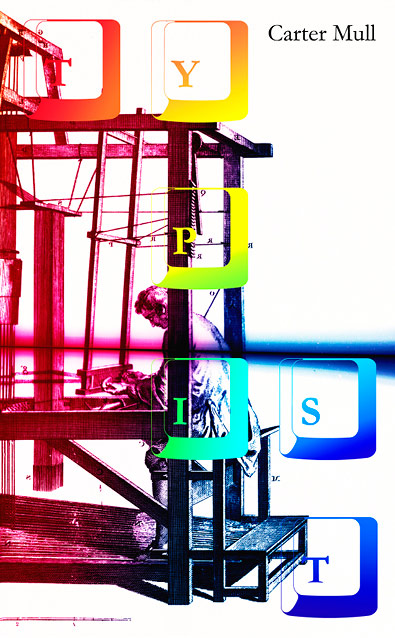Carter Mull
"Salmagundi," Carter Mull: Typist (Paris: Onestar Press, 2014), 19-23.
CELEBRITY.
River Phoenix in denim, River Phoenix in an old sweatshirt, River Phoenix with a buzz cut, drawing a gun from a sleeping bag, River Phoenix in plaid, River Phoenix in a tuxedo, holding hands with Martha Plimpton, burrowing his torso in the hood of a truck in the desert, stroking his hair, high-voiced and wistful, kneeling on a sidewalk in Hollywood.
Amy Winehouse wearing a bandana, Amy Winehouse falling out of a corset, Amy Winehouse at the Pimlico Race Course drinking Mountain Dew, Amy Winehouse’s nose.
Elvis Presley in a tuxedo, in denim, wearing a bandana.
Alice in a pinafore, Alice at croquet, Alice’s head reeling above the treetops, Alice eating cakes, reciting multiplication tables, bobbing like a cork in a sea of her tears.
APHORISMS.
Those who grew up in certain regions of America may regret the demise of axiomatic speech, expressions that mean nothing to anyone so much as to children, to whom they mean yet very little. Suddenly robbed of their learning by a linguistic event whose conventional meaning outstrips the conventions of language alone, the children fumble with the syntax, petty grammatical change that, on its own, won’t get them far. Like foreigners learning a new language, these initiates must transpose each sentence into the register of myth, as though the words themselves summoned a universal rhythm, an ur- state of affairs. Much as Raymond Roussel, composing his novels from logical systems based on puns, echoed the human urge to impose order on the disorderly jabbering that issues from our spittle-filled mouths—mouths slotted with food and drink, that chew and smack and suck, kissing and cursing mouths—much as that, the initiates model the coming-into-language of experience itself. This is perhaps why there is little as disorienting to an adult as a new aphorism in her own tongue that cannot be immediately neutralized....
Continue reading full text here: PDF
